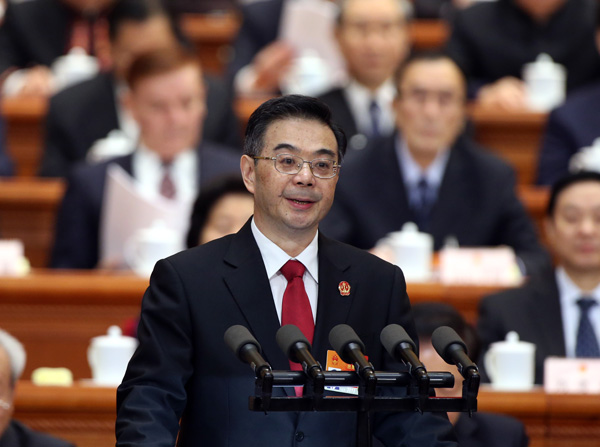 |
|
Zhou Qiang, president of China's Supreme People's Court (SPC), delivers the work report of the Supreme People's Court (SPC) to the national legislature at the ongoing annual sessionat the Great Hall of the People in Beijing, March 12, 2015. [Photo by Wu Zhiyi/China Daily] |
Everyone is equal before the law, but judges handling the corruption cases of high-ranking officials have to be held to especially high standards, Chinanews.com reported.
National prosecutors investigated 28 high-ranking "tigers"?- such as Zhou Yongkang, former security chief, and Xu Caihou, former vice-chairman of the Central Military Commission in 2014, Cao Jianming, procurator-general of the Supreme People's Procuratorate (SPP), said when giving the SPP's annual work report.
So many major cases involving officials at provincial and ministerial level or above being investigated means these "tigers" will stand trial some time in the future.
Wang Suyi, a former senior official from North China's Inner Mongolia autonomous region, has been sentenced to life imprisonment for accepting bribes in July, and he was the first high-ranking official has been sentenced since the 18th National Congress of the Communist Party of China held in 2012.
"In the coming year or so, 28 high-ranking 'tigers' will stand open trial," Zhou Qiang, president of China's Supreme People's Court (SPC), said during an interview after delivering the SPC's annual work report.
The cases of the 28 high-ranking "tigers" are serious and difficult criminal cases, and they need confident and determined courts to handle them.
"We raise the anti-corruption sword against corrupt officials, no matter how high up they were or how much power they had. All should be severely published according to the law," Zhou said.
The determination expressed by Zhou should make those handling the "tigers'" cases sit up.
The trial season for high-ranking officials is coming. Judges are asked to be competent, and make impartial judgments. The standard of the judicial review for these officials should be more strict than normal. Judicial fairness must be upheld and standards cannot be relaxed for high-ranking officials.
The key point to keep on fighting corruption on the road to the rule of law is to handle cases in accordance with the law.
Chief Justice Zhou Qiang also warned of weaknesses in China's court system, denouncing some judges' lack of conscience and professional ethics and involvement in corruption.
The SPC will hold a zero tolerance policy towards judicial corruption, he stressed, adding that it will begin to blacklist officials who interfere in judicial activities and stop senior judges from meddling in cases of their inferiors.
This will undoubtedly promote a clean judiciary and guarantee justice, and fairness will reign in the handling of the cases of the 28 high-ranking "tigers".
Related Stories